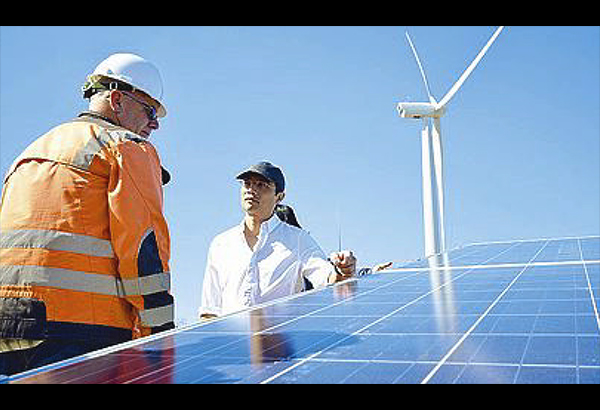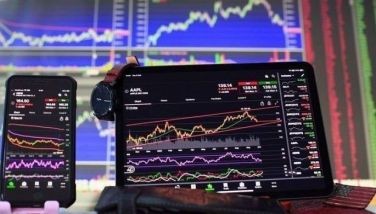Taking action to mitigate impact of climate change
MANILA, Philippines - When Super Typhoon Yolanda struck the country in 2013, everyone knew it was different but nobody expected it to be as devastating as it had been.
The killer calamity that left nearly more than 6,000 people dead served as a wake-up call not just for the people of Tacloban, the hardest hit city, but for the rest of the country as well.
Yolanda sounded the alarm on human induced climate change. This is because, as scientists have noted, storms receive their energy from the ocean and as oceans get warmer storm surges such as Haiyan occur. As such, warmer world would probably have extreme weather.
Experts have said the Pacific is warming in its fastest pace in 10,000 years.
As a result of Haiyan, nearly all sectors of society — from government, civil society, the church and the business community — have been prompted to do address this ill effects of climate change.
In the business sector, the Lopez Group is leading the move to raise awareness on this urgent issue.
During the company’s annual stockholders meeting last May, First Philippine Holdings (FPH) chairman Federico “Piki” Lopez made public the group’s bold stance against the use of coal as it pushes for a decarbonized economy.
“These are extraordinary times that call for extraordinary change and everyone must shift to thinking about the quickest route to a decarbonized economy. The technology to do this is already here. It’s just our mindsets and our conversations that need to be transformed,” Lopez said.
He recalled that when Yolanda struck in November 2013, much of what the group worked for four decades, particularly in its geothermal plant in Leyte, “was overwhelmed by a force no one had ever seen before.”
“The forces unleashed by climate change are now more powerful than they’ve ever been, which compels that we build stronger as we move forward in this changed world. But the phrase also rings true from yet another perspective: now, more than ever, the world needs to rapidly switch to a new energy paradigm if we want to keep the planet inhabitable in the near future and for centuries to come,” he said.
As such, he stressed the need to immediately act on the situation. He said businesses cannot continue “business-as-usual” with their processes as the world gets warmer.
For FPH, one bold, concrete step is to say no to coal plants.

First Gen chairman and CEO Federico Lopez (right) at the Burgos wind and solar plant.
“Today, let me state unequivocally and for the record that FPH and its subsidiaries will not build, develop, or invest in any coal-fired power plant. I’m certain that without having to look too far, this country already has energy alternatives that do not mortgage the future of our children and the future of our planet,” Lopez said.
Citing data from the US-based National Oceanic and Atmospheric Administration (NOAA), Lopez said global average temperatures are rising and this is leading to more severe weather occurrences throughout the world.
“The year 2015 is now the hottest year on historical record globally and it has edged out the previous record of 2014 by a wide margin (+0.16°C, to be precise),” he said.
This means that world is now 1°C warmer than it was in pre-industrial times. The mean global temperature then was 13.7°C.
Today, the world only has 0.5° to 1°C to go before we exceed the Paris COP 21 commitment of restraining the average global temperature rise to less than 2°C from what it was in pre-industrial times.
Beyond this threshold, Lopez said, scientists acknowledge that the world becomes extremely dangerous for its inhabitants and Yolanda will be nothing compared to what we will see then.
Indeed, human-induced climate change is already here, he said.
Moving forward, Lopez said FPH and its subsidiaries aim to be among the bright navigating beacons of Philippine industry “to light pathways toward a decarbonized economy.”
But this, he conceded will not be easy.
“I’m hopeful that soon, more in the Philippine business sector will move toward those junctions where their economic interests converge with that of society and the environment as well,” Lopez said.
At present, the Philippines has 17 operating coal plants and an additional 29 new coal plants will be only by 2020, based on the approvals issued by the Department of Energy.
But the Lopez Group, indeed, has started a conversation of sorts in the business sector.
Diversified conglomerate San Miguel Corp. (SMC), which operates coal plants said, the company, too, would only stick to “clean coal” technology.
“We will continue to invest in clean coal. As long as it’s clean technology, we are investing in that but for the old technology, the traditional dirty coal, we will not go into that,” said SMC president and COO Ramon Ang has said, commenting on Lopez’s pronouncements.
He said investing in a clean coal fired power plant is more expensive at $2 million per megawatt.
The so-called clean coal uses the circulating fluidized bed (CFB) technology, which is a process that has the ability to achieve lower emission of pollutants.
By using this technology, up to 95 percent of pollutants would be absorbed before being emitted to the atmosphere.
As of end-2015, SMC’s power subsidiary SMC Global Power controls 2,903 megawatts of combined contracted capacity and which benefits from diversified fuel sources such as coal, natural gas and hydroelectric.
Corporate tycoon Manuel V. Pangilinan said his group would also stick to clean coal but noted shifting to renewable energy alone would entail costs.
Protecting the environment, he said, comes at a price.
However, experts note that with enough will power, the shift to the use of renewable energy is possible.
Emmanuel Bonoan, vice chairman and COO at KPMG R.G. Manabat & Co., said in a country report on the Philippines published by AsianPower, the shift to renewable energy is taking too long.
He said this is because the capital outlay for fossil fuel plans, such as coal and diesel are relatively cheaper on a per megawatt basis than RE plans.
Another challenge is that incentives in the form of FIT or feed-in-tariff for renewable energy projects remain limited. Other challenges include the slow and lengthy process for permits and environmental clearances.
Indeed, the challenges remain but as FPH’s Lopez said it is an exhilarating and purpose-filled journey that reinvents how we will “uplift lives” towards a more sustainable future.
- Latest
- Trending
































